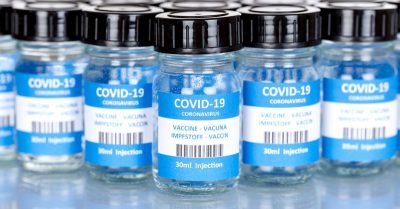COVID Vaccine Hesitancy Widespread, Even Among Medical Professionals

Public health groups, including the World Health Organization, are making a concerted effort to reduce COVID vaccine hesitancy, as many medical professionals and minority groups remain doubtful about safety and efficacy.
***
As details on the latest COVID vaccine contenders flood the news cycle on a daily basis, reports of concerns regarding the safety and efficacy of the vaccine are widespread among many demographics, even including the professional medical community.
As vaccine hesitancy grows, agencies including the World Health Organization (WHO) are stepping up efforts to build vaccine confidence through public relations and communications campaigns.
Surveys reveal vaccine hesitancy
Researchers from the University of California Los Angeles’ Karin Fielding School of Public Health surveyed healthcare personnel working in the Los Angeles metropolitan area. As the Washington Post reported, they found that two thirds (66.5%) of healthcare workers “intend to delay vaccination,” meaning they do not intend to get the COVID vaccine when it becomes available. They plan instead on reviewing the data once it’s widely administered and proven safe.
Seventy-six percent of the vaccine-hesitant healthcare workers cited the “fast-tracked vaccine development” as a primary reason for their concerns. Typically, vaccines take between eight to 10 years to develop, Dr. Emily Erbelding, an infectious disease expert at National Institute of Allergy and Infectious Diseases, told CNN in an article titled, “The timetable for a coronavirus vaccine is 18 months. Experts say that’s risky.”
The coronavirus vaccine frontrunners — Pfizer, Moderna and AstraZeneca — are expected to make their debut in January. The pharmaceutical giants have exponentially accelerated the average safety and review timeline for vaccine development and production, to get the vaccines to market in under a year. Erbelding admitted that the accelerated pace will involve “not looking at all the data.”
Susan Bailey, president of the American Medical Association, said in a video that the number of physicians expressing hesitancy was “unprecedented” and “posed a real risk” to public confidence in vaccines.
A recent Gallup poll showed that only 58% of Americans plan on getting the COVID vaccine when it’s available. An October poll conducted by Zogby found that nearly 50% of Americans have concerns about the safety of the coming COVID vaccines.
A new collaborative survey project by the National Association for the Advancement of Colored People and Langer Research found that Black and Latinx Americans are overwhelmingly concerned about the coming COVID vaccine.
The survey, as reported in the Washington post, claims to be “one of the largest and most rigorous conducted on this topic to date.” It found that only 14% of Black Americans trust that a vaccine will be safe, while only 34% of Latinx Americans trust it will be safe.
The survey also found, in the context of COVID, only 19% percent of Black Americans trust drug companies, while less than a third trust the U.S. Food and Drug Administration to “look after their interests.”
According to the Advisory Committee on Immunization Practices, a group of medical experts who advise the Centers for Disease Control and Prevention (CDC), fears surrounding the painful or harmful side-effects of the COVID vaccine are rooted in reality.
According to CNBC, during a virtual Advisory Committee on Immunization Practices’ meeting on Nov. 23, Dr. Sandra Fryhofer told fellow CDC officials that patients need to be aware that the side effects from the COVID vaccines “will not be a walk in the park.” Fryhofer acknowledged that side effects from the vaccines have been reported to mimic symptoms of a mild case of COVID, including muscle pain, fever, chills and headache.
Fryhofer, who explained that both Pfizer’s and Moderna’s COVID vaccines require two doses, worries that her patients might not come back for a second dose after experiencing potentially unpleasant side effects after the first shot.
As a participant of the Moderna vaccine trials noted “it was the sickest I’ve ever been.”
Health officials try to combat vaccine hesitancy
Despite this, officials at the forefront of the COVID response plan to combat vaccine safety concerns and hesitancy using, what some are calling, questionable psychological techniques.
For example, the WHO, which named “vaccine hesitancy” as the top global public health threat, has hired the PR firm Hill + Knowlton to identify micro-influencers, macro-influencers and “hidden heroes” on social media who could covertly promote the organization’s image as a COVID authority in order to “ensure WHO’s advice and guidance is followed.”
Cass Sunstein, the chairman of WHO’s Technical Advisory Group on Behavioral Insights, recently wrote an article in Bloomberg in which he promoted the use of popular celebrities, athletes and actors as tools for vaccine persuasion against those who “lack vaccine confidence.”
“Trusted politicians, athletes or actors — thought to be ‘one of us’ rather than ‘one of them’ — might explicitly endorse vaccination and report that they themselves have gotten the vaccine,” Sunstein wrote.
Then there’s the “Guide to COVID-19 Vaccine Communications,” developed by the University of Florida and the United Nations that aims to help governments improve COVID vaccine uptake. The authors of the guide promote the tactic of covertly using trusted community leaders to help with pro-vaccine information.
Citing vaccine hesitancy among the African American community, the guide suggests that barber shops and hair salons in predominantly black neighborhoods might be tapped to help disseminate approved vaccine messaging.
*
Note to readers: please click the share buttons above or below. Forward this article to your email lists. Crosspost on your blog site, internet forums. etc.
Jeremy Loffredo is a reporter for The Defender.
Credits to the owner of the featured image

